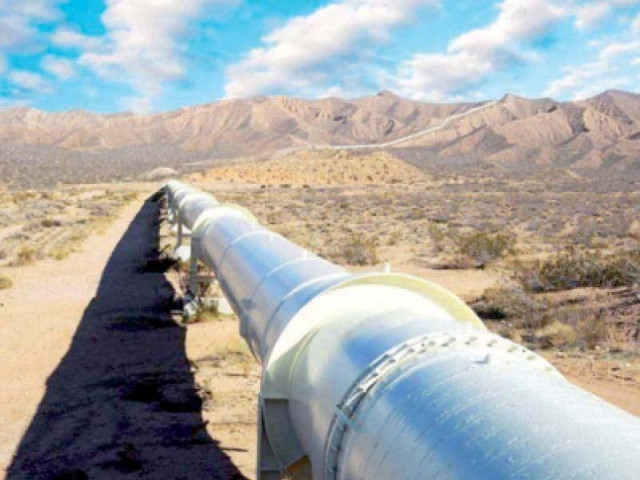ECC to approve funds for gas projects
It will also mull request for amendment to PQA master plan for LNG terminals

The Economic Coordination Committee (ECC) is set to approve a funding plan for gas import projects, mainly for laying a gas pipeline in collaboration with Russia for the transmission of imported gas.
The Supreme Court had earlier given directive for implementing a liquefied natural gas (LNG) pipeline project from Karachi to Lahore by utilising funds collected as gas infrastructure development cess (GIDC).
The Petroleum Division, in a summary sent to the ECC, sought approval for executing different gas pipeline projects, which included the Turkmenistan-Afghanistan-Pakistan-India (TAPI) pipeline as well.
The ECC, in its meeting held on February 10, 2020, approved that rationalised expenditures, as endorsed by the board of Inter State Gas Systems (ISGS), including the TAPI and North-South Gas Pipeline (NSGP) commitments, should be funded through GIDC funds.
Approval was granted for funding ISGS’s operations by Government Holdings (Private) Limited (GHPL), conditional upon ISGS being financially self-sustaining after the first project reached the closure stage.
GIDC was primarily meant for projects being implemented by ISGS. However, no financing has been released to date for development activities related to TAPI, NSGP, Iran-Pakistan (IP) gas pipeline and Gwadar-Nawabshah Gas Pipeline (GNGP) projects except for the government’s equity contribution to TAPI Pipeline Company Limited.
As a result of unavailability of GIDC funds, ISGS has been constrained to rely on financing from the parent company - GHPL - for project-related activities. This was intended as a stopgap arrangement for three years, during which ISGS was advised by the Petroleum Division to make optimal efforts for developing a revenue stream of its own.
The Supreme Court, in its judgement in the GIDC case dated August 13, 2020, directed the federal government shall take all steps to commence work on the laying of North-South pipeline within six months and on TAPI pipeline as soon as its laying in Afghanistan reached the storage where the work of laying pipeline on Pakistan’s soil could conveniently start and on IP pipeline as soon as sanctions on Iran were no more an impediment in its laying.
In case, no work is carried out on the North-South pipeline within the prescribed time and for laying any of the two other major pipelines (TAPI and IP), though the political conditions become conducive, the purpose of levying cess shall be deemed to have been frustrated and the GIDC Act 2015 would become permanently inoperational and considered dead for all intents and purposes.
ISGS envisages that while progress on its other strategic projects like TAPI and IP will be dependent on external geopolitical factors beyond control of the company and the federal government, NSGP activities are on track and will be realised by FY24 and generate revenues for the company.
Therefore, an arrangement for funding the gap period of two to three years will have to be made through GIDC, along with repayment of accrued loan to GHPL.
In view of the above, the following is submitted for ECC’s approval - utilisation of funds from GIDC amounting to Rs1,717.23 million for the repayment of GHPL’s loan. All direct and indirect costs in relation to ISGS gas import and infrastructure projects shall be met through the GIDC funds until any of ISGS’s projects generate revenue. Funds so approved will be released to GHPL for ISGS’s utilisation.
Funds for the acquisition of land or ROW, as well as the development of ISGS projects, shall be made available to ensure smooth progress, especially for NSGP. Any funding provided by GHPL to ISGS, as a stopgap arrangement, to meet the immediate funding requirements of ISGS, will be reimbursed as actual to GHPL by the Finance Division from GIDC funds within three months of the cash call made by ISGS.
ISGS is the nominated entity of the government of Pakistan for implementation of various strategic gas infrastructure projects of international nature on a government-to-government basis.
In pursuance thereof, the ECC, in its meeting on December 15, 2016, tasked GHPL to fund all project activities of ISGS in the form of a medium-term loan. As directed by the ECC, ISGS and GHPL signed a loan agreement on August 9, 2018, wherein it was agreed that the loan shall carry an interest rate of annual Kibor +0.1%, effective from the date of disbursement. Subsequent to the loan agreement, GHPL provided loans for project development and administrative expenditures, which along with the interest accrued, stands at Rs1,717.23 million.
Separately, the Ministry of Maritime Affairs is seeking approval of the ECC to amend the master plan for setting up several LNG terminals on BOOT basis. Sections 10 and 11 of the Port Qasim Authority Act 1973 provide that the authority shall prepare a master plan and a phased master programme for the development of port area and the plan and programme shall be submitted to the federal government for approval.
The Port Qasim master plan was initially prepared by Nespak, in association with Swan Wooster Engineering Company, Canada in 1975 for a period up to 2000. In order to incorporate changes made in the master plan since 2001 and for future planning, Port Qasim was recently in the process of appointing a consultant for preparing the master plan.
Firms have been shortlisted and the case is being presented to the infrastructure development committee of the PQA board for selection of a consultant. PQA intends to establish LNG terminals, multi-purpose terminals, an integrated container terminal on BOT basis as per modern design and practice.
These terminals are conceived for the growing requirement to enhance the container handling capacity. The PQA board approved resolutions to include the terminals in the existing master plan.
These included establishment of two LNG terminals on BOT basis, establishment of two multi-purpose cargo terminals on BOT basis, establishment of one integrated container terminal on BOT basis subject to first right of refusal as per existing implementation agreements.
The ECC has been requested to approve the proposed amendment to the PQA master plan under Sections 10 and 11 of the PQA Act 1973 for establishing new terminals.
Published in The Express Tribune, December 24th, 2020.
Like Business on Facebook, follow @TribuneBiz on Twitter to stay informed and join in the conversation.



















COMMENTS
Comments are moderated and generally will be posted if they are on-topic and not abusive.
For more information, please see our Comments FAQ